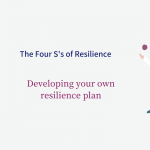Life is full of ups and downs, challenges, and unexpected events. The ability to navigate these hurdles and bounce back from adversity is what we call resilience. Resilience is a vital trait that empowers individuals to adapt, grow, and thrive despite setbacks. In this article, we will explore the concept of resilience, its importance, and strategies to develop this valuable skill.
Understanding Resilience:
Resilience refers to the capacity to recover, adapt, and even flourish in the face of adversity. It’s not about avoiding challenges but rather about facing them with a positive mindset and the belief that you can overcome them. Resilient individuals possess a strong sense of self, emotional intelligence, and effective coping mechanisms.
The Importance of Resilience:
Resilience plays a crucial role in various aspects of life:
- Mental Health: Resilience helps prevent and manage mental health issues such as anxiety and depression. It enables individuals to handle stress and negative emotions more effectively.
- Personal Growth: Overcoming challenges fosters personal growth and development. Resilience encourages individuals to embrace change and learn from their experiences.

- Relationships: Resilient people often have healthier relationships. They communicate better, offer support to others, and can navigate conflicts more constructively.
- Professional Success: Resilience is highly regarded in the workplace. It enables individuals to handle setbacks, manage work-related stress, and adapt to changing environments.
Strategies for Building Resilience:
- Develop a Strong Support System: Surround yourself with friends, family, and mentors who provide emotional support and encouragement during difficult times.
- Cultivate a Positive Mindset: Focus on the positives in any situation and practice reframing challenges as opportunities for growth.
- Practice Self-Care: Prioritize your well-being by engaging in activities that bring you joy, exercise regularly, and get adequate sleep.
- Build Emotional Intelligence: Develop the ability to understand and manage your emotions, as well as empathize with others. Emotional intelligence enhances your resilience.
- Set Realistic Goals: Set achievable goals and celebrate your accomplishments along the way. This reinforces a sense of accomplishment and progress.
- Learn Problem-Solving Skills: Develop effective problem-solving techniques to address challenges methodically rather than feeling overwhelmed.
- Practice Mindfulness: Mindfulness techniques, such as meditation and deep breathing, help you stay present and reduce stress.
- Seek Professional Help: If faced with significant adversity, don’t hesitate to seek help from a therapist or counselor. They can provide guidance and coping strategies.
- Adaptability and Flexibility: Embrace change as a natural part of life and develop the ability to adapt to new situations.

- Maintain a Sense of Humor: Humor can provide perspective and lighten difficult situations, making them easier to navigate.
- Practice Self-Compassion: Treat yourself with kindness and understanding, acknowledging that everyone faces challenges.
- Learn from Adversity: Reflect on past challenges and setbacks, identifying lessons learned and areas for personal growth.
- Build Strong Relationships: Foster meaningful connections with others, as a strong support network enhances resilience.
- Stay Solution-Focused: Focus on finding solutions and taking actionable steps to address challenges rather than dwelling on problems.
- Develop Cognitive Flexibility: Train your mind to view situations from different perspectives, expanding your capacity to respond effectively.
- Engage in Activities You Love: Pursuing hobbies and interests that bring you joy can serve as an emotional outlet during challenging times.
- Practice Gratitude: Regularly acknowledge and appreciate the positive aspects of your life, which can enhance your overall resilience.
In conclusion, building resilience is an ongoing journey that involves developing a range of skills, attitudes, and strategies. Resilience empowers individuals to navigate life’s challenges with grace and optimism, fostering personal growth, emotional well-being, and success in various areas of life. By implementing these strategies, you can cultivate the ability to bounce back from adversity, adapt to change, and thrive in the face of challenges.




















Add Comment